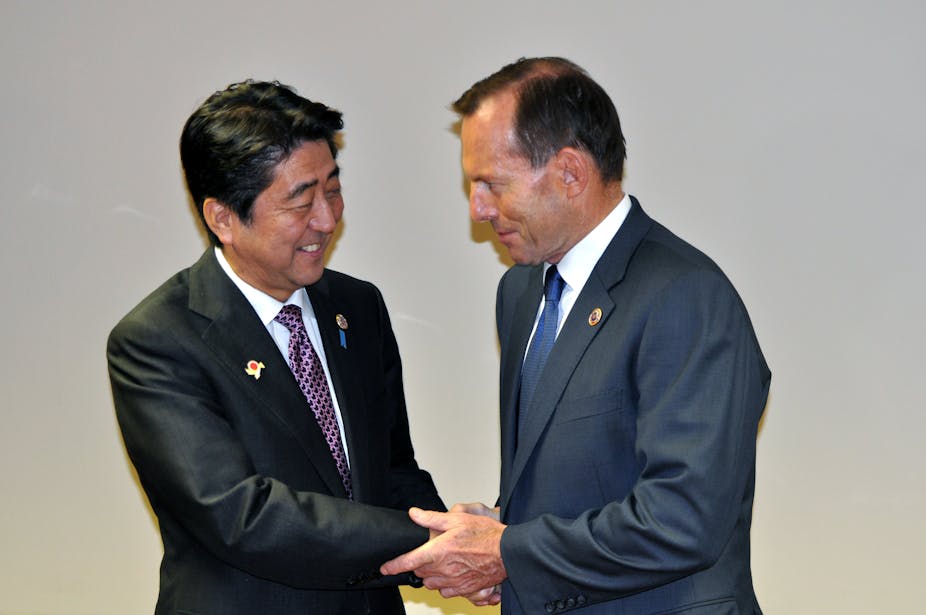At the joint Association of Southeast Asian Nations (ASEAN)-East Asia summit just held in Brunei, prime minister Tony Abbott hailed Japan as Australia’s “closest friend in Asia”. Abbott invited Japanese prime minister Shinzo Abe to visit Australia, including the rare privilege of an address to parliament - which Abe has accepted.
Far from being diplomatic rhetoric, there is plenty of substance to Abbott’s generous praise.
Although overtaken by China since the 1990s, Japan remains Australia’s second largest export market, which Abbott hopes to improve by concluding a free trade agreement (FTA) with Japan within a year. He also aims to sign FTAs with China and South Korea, Australia’s third largest market, within the same time period.
History of Australia-Japanese relations
The Coalition has a long tradition of boosting ties with Japan. The Menzies government negotiated the first postwar Commerce Treaty with Japan in 1957, followed by the Treaty of Friendship and Cooperation, signed by the Fraser Government in 1976. In his 2009 book Battlelines, Abbott warmly considered Japan as an honorary member of the “Anglosphere”, sharing democratic values and common interests.
What may be surprising to many is the extent to which Australia and Japan have been steadily increasing their security ties. This has a little-known historical precedent - while Japan of course posed the greatest ever direct military threat to Australia during World War Two, Japan was a member of the Allies in World War One, with the Imperial Japanese Navy escorting ANZAC convoys to the Middle East.
Current Australia-Japan relations
More recently, the Australian Defence Force (ADF) and the Japanese Self Defence Forces (JSDF) cooperated in United Nations peacekeeping missions in Cambodia and East Timor, in security operations in the Afghanistan and Iraq Wars, and in ongoing UN-authorised anti-piracy patrols off the Horn of Africa.
Joint military training has also continued to increase, particularly in naval exercises - as symbolised in the participation of the Maritime JSDF in the recent naval centenary celebrations in Sydney Harbour.
This growing security cooperation has been formalised in higher levels of diplomatic agreements. Following the Joint Declaration on Security Cooperation (JDSC) signed in 2007, regular bilateral “2+2” foreign and defence ministerial talks, as well as Trilateral Strategic Dialogue (TSD) meetings with the US have been held. This was upgraded in 2010 to the Acquisition and Cross-Servicing Agreement (ACSA), a level of defence cooperation just below that of a treaty for a full military alliance.
The most recent TSD talks were held during the APEC summit in Bali, attended by the foreign ministers of Australia, Japan and the US.
Controversies and conflicts
The major sticking point in Japan-Australian relations remains Australia’s bipartisan opposition to Japan’s “scientific” whaling program, a judgment on which is to be handed down in the International Court of Justice “in due course”.
Significantly, Abbott did not raise the whaling issue with Abe in Brunei, nor human rights with the leaderships of China and Vietnam.
Concerns over Japanese overfishing, and doubts over the long-term commitment of Toyota to maintaining its car manufacturing in Australia (following the withdrawal of Mitsubishi), could be other ongoing points of contention.
Overall though, the Abbott and Abe governments seem set to pursue closer ties between Australia and Japan. One possible future development could depend on the success of Abe’s ambition to reinterpret the pacifist Constitution of Japan. This would enable the JSDF to be upgraded into a less-restricted national military, allowed to participate in “collective self-defence” with its allies - principally the US.
Would this participation also be extended towards Australia, given the increasingly closer military and security ties with Japan? The tone of Abbott’s meeting with Abe indicates this could be a definite possibility, with Abbott appearing to encourage Japan’s path towards formal remilitarisation.
Australia in the region
Since Abbott made such a prominent effort to reboot relations with Indonesia in his first official overseas visit, Jakarta should not be too fussed about him praising Japan so effusively.

However, China’s reaction is far more of a concern. China issued a warning following the Bali TSD meeting for Australia and the US not to get involved in its disputes with Japan and several ASEAN states over contested island territories in the East and South China Seas.
This could prove to be one of the most challenging foreign policy issues for the Abbott government, particularly given the ongoing territorial confrontation between China and Japan over the Senkaku/Diaoyu Islands. If tensions between Japan and China escalate into a future armed conflict, Australia would inexorably find itself drawn into this disastrous scenario - a prospect which Abbott at least professes to be concerned about.
The central dilemma of Australia’s foreign policy is therefore becoming ever more complex: how not to alienate relations with its largest trading partner (China), while maintaining its core military alliance with the US, and a deepening security partnership with Japan.

